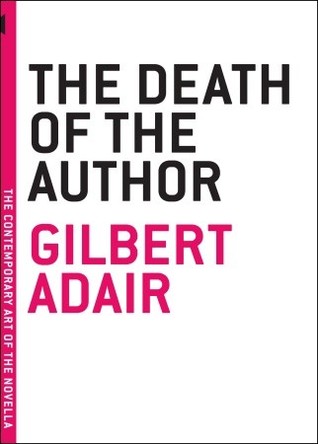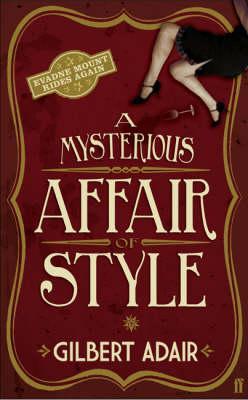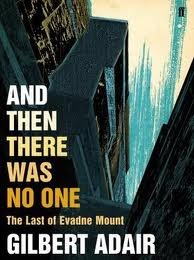While I’ve read a number of Gilbert Adair’s recent books, the older titles from his back catalogue are out of print. One of these titles, The Death Of The Author (1992), has thankfully been given a second lease of life in the United States, thanks to Melville House Publishing‘s new Contemporary Art of the Novella series, a companion to its Art of the Novella, a series showcasing the likes of Joyce, Flaubert, Proust, and Tolstoy.
But the Contemporary range is no stranger to lesser known names itself – The Pathseeker, by Nobel laureate, Imre Kertész was the flagship title So, good company indeed. And, when my copy of The Death Of The Author dropped through the door, so impressed was I by the production values (glossy cover with flaps, bold colour, and nicely tactile pages) that I made the snap decision to purchase all the others within the series, with the intention of subscribing to future releases too.
But to the book. Adair’s work – his fiction, anyway – tends to fall one of two ways: the light entertainment, like his Evadne Mount trilogy; or the heavier entertainment, erudite, but still light. All come with an element of postmodernism. And The Death Of The Author, falling on the erudite side, is a postmodern book about postmodernism.
Although my reading of the book went without knowledge of the events that inform it, I daresay it’s not necessary in enjoying the novella. The reference point is Paul de Man, the Belgian literary theorist whose work had a different light shed upon it when it was discovered he had written collaborationist articles during World War II, including one of an anti-Semitic nature. De Man’s life story, of living during wartime and teaching in the States, is given here to our narrator, Léopold Sfax.
Sfax is a celebrity in the world of literary criticism, having published two books, the first a study of Yeats:
That book, whose appearance produced quite a commotion, I may even say a scandal, in the advanced academic circles of the day, was Either/Either – I realized I had “arrived” when the Partisan Review reviewer wrote of it as having been wildly overrated, for to be described as overrated by one critic meant after all that I had been highly rated by several.
In it, Sfax argues that literary meanings are not intentions of their authors, no matter what they say – that it’s the reader and their interpretation, be it this or that, that makes the meanings. Following on from this book is the one that makes his career, The Vicious Spiral, the book whose arguments, not given a name, become simply known as ‘the Theory’.
The more closely a text is studied the more insidiously is it drained of sense or legibility, just as the more fixedly a word is stared at on the page the more too is it drained of legibility or sense, striking the increasingly bewildered eye as a mere weird disconnected sequence of squiggles. Words are far older and fickler and more experienced than the writers who suffer under the delusion that they are “using” them. Words have been around. No one owns them, no one can proscribe how they ought to be read, and most certainly not their author.
If de Man is the template for Sfax’s life, Roland Barthes is the inspiration for the Theory, being an echo of his essay Death Of The Author. And it’s the popularity of this book that brings us to the opening scene as Sfax talks with a female student of his who would like to write his biograph. Of course, rather than have someone else tell his story, The Death Of The Author becomes his autobiography, and he meanders off on events in his life, coming each time to the moment that spurred him to sit down and write in the first place.
With any Adair book, being vigilant is part and parcel of reading him, for his texts are not without their games, and there’s always that delight on realising, one again, that he is one, sometimes two, steps ahead. In The Death Of The Author he more than delivers, his games bringing together a beautiful spoof of literary criticism and memoir that, toward the end, adds a murder mystery that fulfils the promise of its title. And, when this cauldron of fun comes to the boil, Adair adds a stinging twist that had me screaming, “you bastard!”
To read The Death Of The Author is not unlike what it must be like to have subscribed to Sfax’s Theory:
The world had been turned upside-down – what had always been true was false, what had been important was marginal, what had been meaningful was meaningless – and it made sense, it made sense!




An excellent account of a terrific book, Stewart. When I first read it – maybe ten years ago? – I had no idea who or what Sfax and his Theory were based on. I picked up a copy of this new edition even though I still have my old Heinemann hardback, and look forward to revisiting it like an old friend soon.
I’ve read several novellas in this series and enjoyed them all. I’ll be adding this one to my TBR list.
No big worries there. A quick peek at Wikipedia gives all the grounding needed. Interestingly, since reading this I’ve since discovered that Sfax’s Either/Either is a riff on Kierkegaard’s Either/Or.
CB James, when you get around to it, do drop by again and let me know how you found it.
It’s nice to see this book getting mentioned. I found it a few years ago in a charity shop, impulse bought it and loved it. Now I’m wondering if I’ve still got it in a box somewhere. I read another of his later—The Key to the Tower—but it didn’t have quite the same impact on me.
Hi Rob. I’ve got The Key To The Tower waiting to be read, and I’ve also got the one after that, A Closed Book, which was my first Adair a couple of years back. I’ll certainly be reading both in the near future, and Love And Death On Long Island will come in time, but not until I’ve got its inspiration, Mann’s Death In Venice under my belt.
I’ll be curious to find out what you make of Tower and A Closed Book – the latter I meant to read, but didn’t quite get around to it before my mind wandered on to other authors. Of course, it’s never too late!
As I said, A Closed Book was my first Adair a few years back and my lingering impressions are that I was impressed at how he had managed to make the two main characters (and the supporting cast) so recognisable from their speech alone. No need for actions, descriptions, or other quirks – the whole book is (barring some necessary passages) written in dialogue.
Some of the references were of its time – Princess Diana, Tony Blair, Robin Cook, etc. – but the ending provides a typical twist that makes it a worthwhile entertainment.
A pedant writes: It’s actually The Key of the Tower, not The Key to the Tower, though of course the latter is the more natural way of putting it. I only mention this because the title of the book, and the of rather than to, is rather important in the plot! Clever bugger, that Adair chap…
Mea culpa! I had the same problem with Kurkov’s A Matter Of Death And Life, more used to writing life and death are we.
Out of interest, has anyone read his non-fiction? Things like The Postmodernist Always Rings Twice or The Real Tadzio. Or perhaps his sequels to kiddy books – the Peter Pan and Alice In Wonderland ones? I’m wondering whether to go through it all, for the sake of completenes.
I’ve not read any of the non-fiction, but I’d be interested to know if it’s worth reading. I’m also curious about his recent mystery stories. Anybody read those?
By mystery stories I presume you meant the Evadne Mount trilogy? I have the first two (The Act Of Roger Murgatroyd and A Mysterious Affair Of Style) under review, with the third, And Then There Was No One, due out in January 2009 from Faber. The first was good, the second less so, but the third sounds good, mixing up Agatha Christie with Sherlock Holmes.
Thanks Stewart, I’m off to read your reviews now. I can see I haven’t spent nearly enough time in your archives.